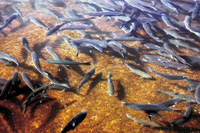forum
library
tutorial
contact

ESA Reform Likely 'Road Kill'
by Pat McCoyCapital Press, February 9, 2007
|
the film forum library tutorial contact |

|
ESA Reform Likely 'Road Kill'by Pat McCoyCapital Press, February 9, 2007 |
Walden says issue probably won't come up for hearing in Democratic Congress
 Modernizing the Endangered Species Act, a long-enduring wish for Westerners, is just one more road kill in the new Democratic Congress.
Modernizing the Endangered Species Act, a long-enduring wish for Westerners, is just one more road kill in the new Democratic Congress.
In fact, it likely won't even come up for a hearing, said Rep. Greg Walden, R-Ore.
"The new Speaker of the House, the majority leader, the majority whip, the Democratic Caucus chairman and the new Democratic chairman of the House resources committee all voted against our reform proposals in the last session of Congress," Walden said. "With the leadership all solidly against it, it's likely complete road kill."
ESA is dreadfully overdue for modernization, he said.
"My own strong views on that point date from the Klamath Basin situation, when irrigation water was cut off to farmers. During the subsequent investigations and hearings, we found two principal decisions led to that cutoff. Neither was scientifically based. They should never have been made," he said.
"That's why I wrote a requirement into my reform bill calling for scientific peer review of all ESA decisions. Somehow the Democrats perceive that as bad."
Peer review is nothing new. It is required and conducted under laws governing Health and Human Services, the Marine Mammal Protection Act, the Food and Drug Administration and even in the No Child Left Behind Education Act, he said.
Peer review fundamental
"Peer review is a fundamental part of most scientific evaluations. Why not require a second opinion when you're trying to balance the survival of a species against the survival of a community? I can't imagine a context where it's more important. I never said that second opinion has to be followed," he said.
"Democratic opposition is absurd, but they're so beholden to the special interest groups who oppose any changes to the ESA that I'm afraid any ESA changes during this session of Congress are going to be pretty limited," he said. "I never give up. I'll continue working to find some angle or approach that will help us fix some of the problems, but I'm going into it with my eyes wide open. We'll have to be creative but also realistic about what we can or can't accomplish."
Possible changes are most likely to impose more stringent restrictions, less flexibility and more federal control as opposed to local. That ignores one major lesson the U.S. public should have learned over the years, Walden said.
Understanding poor
"People passing these laws simply have no idea of our desert or forest lands climate. After being back here a few years, I'm starting to understand. They're used to huge summer rain storms. We get thunderstorms in eastern Oregon, too, but very little rain. These people don't understand how tinder dry it is or how limited water is," he said. "We Westerners have been great stewards. We've learned to manage that water. Farmers and ranchers are the first and best environmentalists out there. They created soil and water conservation districts, and they've worked hard to improve their water quality, quantity and wildlife habitat.
"Somehow that doesn't seem to apply out here," he said.
Walden points to the Anacostia River, which flows through Washington, D.C. Billions of gallons of sewage and stormwater runoff are dumped in it.
"Yes, it's being cleaned up, but what's going on is nothing compared to the incredible amount of work being done on the Snake and Owyhee rivers, for instance," he said. "I really choke when I read about people labeling the Willamette River as one of the most polluted in the nation."
Sen. Mike Crapo, R-Idaho, will reintroduce his ESA reform legislation, said Lindsey Nothern, on his staff.
"Senator Crapo's bill calls for tax breaks for ESA recovery efforts, which could send his reform bill to the Finance Committee, rather than the Environment and Public Works Committee. There was some agreement during the last session on the idea of tax credits and reforms allowing landowners to be more involved," he said. "However, the odds of getting something from the Environment and Public Works Committee don't look real promising if it moves in that direction."
learn more on topics covered in the film
see the video
read the script
learn the songs
discussion forum
